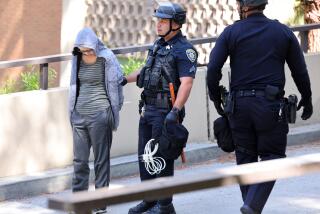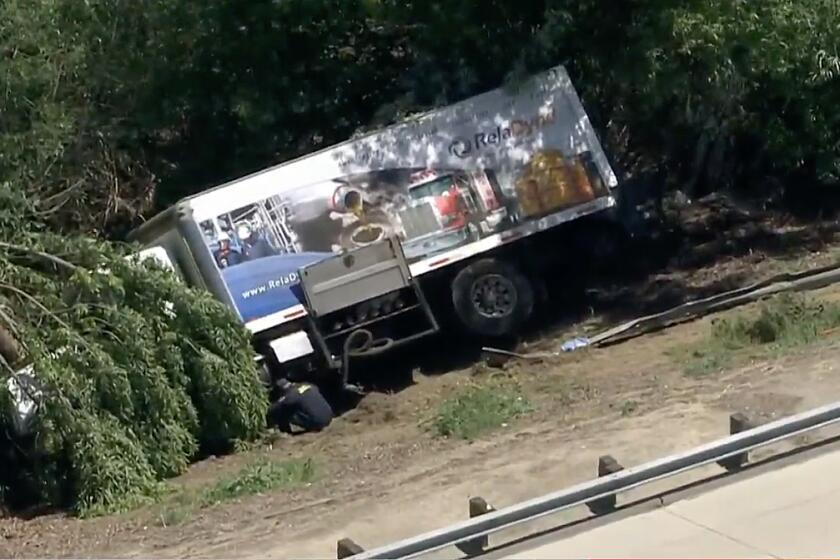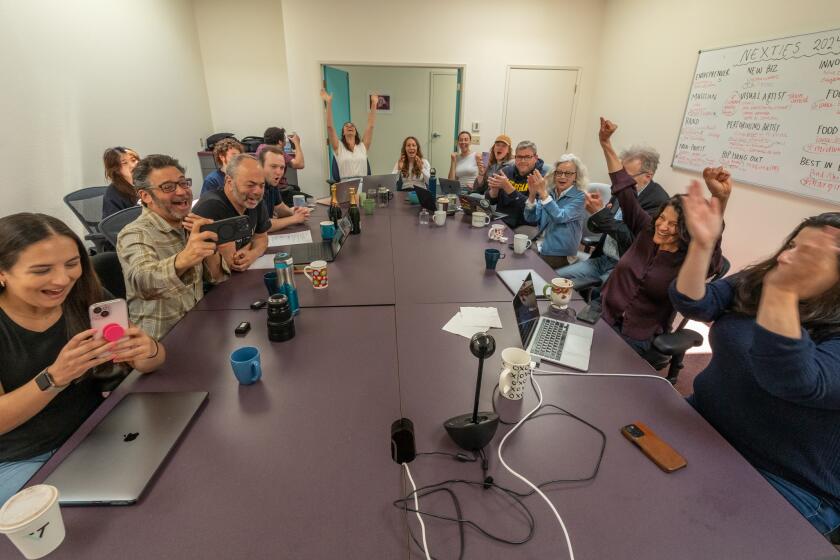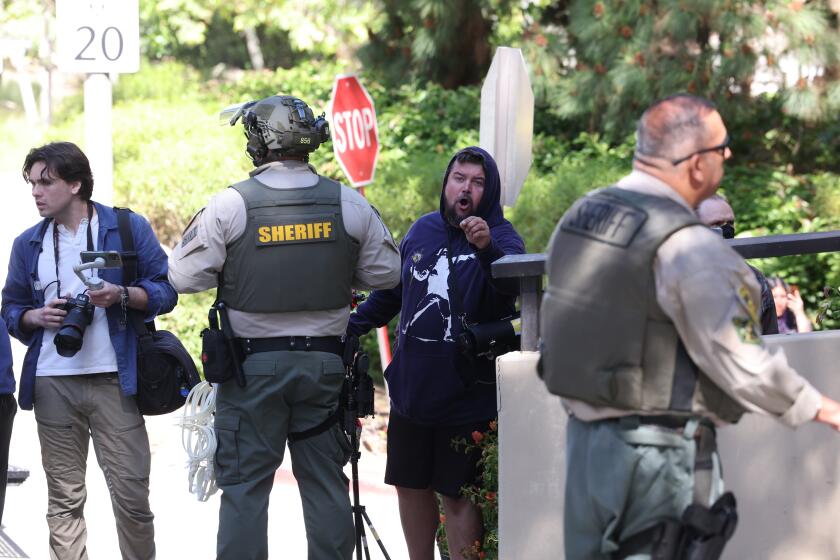L.A. Police Panel Opposes Bill on Personnel Files
The Los Angeles Board of Police Commissioners waded into the dense and overlapping areas of technology and personnel records Tuesday, receiving an ambitious blueprint for improving the department’s computer systems and voting to oppose a state bill that would force deletion of some personnel files from LAPD computers.
Discussion of those items dominated a long and sometimes heated commission meeting.
Police reform advocates and police union representatives clashed over legislation to remove some police records from management scrutiny, while some commissioners voiced both optimism and concern over a report that recommends major investments in the LAPD’s woebegone technological capacity.
Councilwoman Laura Chick, who helped initiate the report, made a rare appearance before the commission to herald the importance of the technology analysis. It recommends investment of about $209 million in new computers and other technological improvements.
“This is a historical first,” Chick said. The Mitretek consulting report, she added, marked the first “outside, professional and comprehensive analysis” of the LAPD’s technology needs, and it charted a course for the Police Department to follow as it tries to get the most out of its officers by making use of the modern, efficient equipment.
*
Over the next 10 years, representatives of Mitretek said, the $209-million investment would pay for itself and save the LAPD an additional $200 million to $750 million, an enormous sum that could pay for the equivalent of 431 to 1,002 additional police officers.
Still, commissioners worried that they are overwhelmed with competing demands, and they noted with dismay that they recently approved a technology that the new report recommends against. Just last year, the commission voted to spend $26 million installing new mobile digital terminals in every LAPD car. The new report recommends scrapping that system in favor of laptop computers.
“Are you saying that money was wasted?” an agitated Commissioner Art Mattox asked one of the consultants.
The consultant responded that although Mitretek proposes a different solution, the department can replace the new terminals as they wear out, so the money will not necessarily have been squandered.
The meeting had not even ended before new questions arose. Linda Bunker, who heads the LAPD’s Emergency Command Control Communications System, told commissioners she was surprised by the report’s endorsement of laptop computers. “I was taken a little off guard,” Bunker said.
LAPD officials studied the use of laptops last year but recommended the other system in part because they felt laptops would not hold up well to the rough and tumble of police work.
Commissioners did not act on the technology report but formally received it and passed it along to the City Council’s Public Safety Committee, which Chick chairs. The commission, council and LAPD brass all plan to review its recommendations, along with those from two other recently completed consultant reports, and spend the coming months developing a plan for how to proceed.
Even as commissioners were wrestling with how to improve the department’s technology, they also were confronted with the latest debate about how the LAPD keeps and uses its personnel records, which are in the process of being computerized.
*
A bill working its way through the state Legislature would require police departments to remove all unfounded personnel complaints from the files of police officers, a move that union representatives support but reform advocates oppose. Although that debate is playing out primarily in Sacramento, the bill, sponsored by Assemblyman George House (R-Hughson), has significant implications for the LAPD and other California law enforcement agencies.
Tuesday, acting Police Chief Ronald Banks expressed LAPD management’s opposition to the bill, saying it would deprive police supervisors of a tool they can use in assessing an officer’s fitness for sensitive assignments. Looking at complaints, even those ruled unfounded, can give supervisors an idea of whether a particular officer might be exhibiting patterns of disturbing behavior, Banks said. He added that deleting the information from LAPD files would be cumbersome and time-consuming.
Other opponents of the legislation, including the Police Commission’s inspector general and a representative of the American Civil Liberties Union, echoed Banks’ comments and said removing records from police officer files would make tracking potentially problem officers more difficult.
A board member from the Los Angeles Police Protective League said it was wrong to saddle officers with complaints that were not sustained by police investigations.
“We see this as an issue of basic fairness,” said Dave Hepburn. “Why the department would rely on information when the information was proven to be false . . . is beyond me.”
Police commissioners expressed sympathy for officers who want their personnel material handled fairly, but commission President Raymond C. Fisher said he also believed that the state legislation would send the wrong signal to the community about reform efforts. Moreover, Fisher and other commissioners criticized ambiguous wording of the state bill. It does not, for instance, define the term “unfounded.”
Commissioner Warren Jackson, the board’s newest member and a lawyer who deals with employment issues, read aloud from the proposed legislation and then noted that it was “not exactly a model of clarity.”
He joined other board members in unanimously opposing the bill. With that vote, the LAPD became the latest large law enforcement agency in California to come out against the legislation, which could come to a vote any day. The Los Angeles County Sheriff’s Department is on record in opposition, as is the San Francisco Police Department.
In other business, the commission voted to approve a merger of the LAPD and Metropolitan Transportation Authority police. Before that long-discussed merger can take place, it requires the approval of the Los Angeles County Board of Supervisors and the City Council.
More to Read
Start your day right
Sign up for Essential California for news, features and recommendations from the L.A. Times and beyond in your inbox six days a week.
You may occasionally receive promotional content from the Los Angeles Times.







